What is Intuitive Eating?

Intuitive eating is an approach to health and food that has nothing to do with diets, meal plans, discipline or willpower. It teaches you how to get in touch with your body cues like hunger, fullness and satisfaction while learning to trust your body around food again. Here’s an overview of intuitive eating including the science behind it, the ten principles of intuitive eating, and the difference between intuitive eating and mindful eating.
Portions of this blog include excerpts from my book Unapologetic Eating: Make Peace with Food and Transform Your Life.
If you’d like a copy of this blog as a PDF download, you can download a copy here.

What Is Intuitive Eating?
Intuitive eating is a non-diet approach to health and wellness that helps you tune into your body signals, break the cycle of chronic dieting and heal your relationship with food. The intuitive eating framework was created by two registered dietitians, Evelyn Tribole and Elyse Resch, in 1995, based on their experience working with clients.
Tribole and Resch’s intuitive eating framework is a non-diet, self-care approach to nutrition, health, and well-being that helps people make decisions based upon their bodies’ inner wisdom instead of external rules or restrictions. Rather than using outside sources—such as counting calories or points, measuring portions, or following certain eating or food rules—to determine what, when, and how much to eat, you turn inward and listen to, and trust, your body’s cues to guide you.
We Are Born Intuitive Eaters
We are all born with the instinct to know when we are hungry and how much we need to eat. It is programmed into our brains from birth; we come into the world knowing how to feel hunger and use that cue to drive us toward food and eating. Just watch any baby, and you will see this instinctive eating at play. When babies feel hungry, they will cry until fed. Once they start feeding, they will eat until full and then refuse any more. This cycle then repeats itself every few hours. Babies naturally know how to honor their hunger cues; the drive to eat is instinctive.
We aren’t born holding judgments of what foods are “good” or “bad,” what the “proper portion” is, or how much food is “too much.” If you look at any toddler, who has adequate access to a variety of food, and you can see this at play.
I witnessed this firsthand with my twin niece and nephew when they were around two years old. They loved all kinds of foods, and they loved to eat, but what and how much they ate varied greatly from day to day. Some days, even if I fed them one of their favorite foods, they’d take just a few bites before confidently proclaiming, “All done!” and hopping up to go play. Then, without fail, the next day or two, they would be bottomless pits—I couldn’t feed them enough! And that makes sense because, despite what diet culture tells us, our bodies do not need the same amount of food every single day.
Outside Factors Disrupt Our Innate Connection
As we get older, outside factors begin to get in the way of this deep connection to our inner body wisdom. Any situation in which you experience food deprivation will make it difficult to listen to your natural hunger, fullness, and satisfaction cues.
Whether this deprivation is caused by poverty, where there is a very real chance that you won’t have enough food, a medical condition that causes trauma and disrupts your connection to your body (I’ll address both these factors in more detail later in this chapter), or via diet culture, the outcome is the same. In these circumstances, food—and our relationship to it—is no longer simple and pleasurable; it becomes complicated and often problematic.
Diet culture is a big factor in deprivation for many people. Diet culture weasels its way into our brains from a very young age. Most of my clients can recall being as young as four or five years old and having an adult limit their food because they were eating “too much” or because sugar was “bad.”
Well-meaning parents or caregivers may have set rules and restrictions related to food dictating what, when, and how much you were allowed to eat. You may have been taught to finish everything on your plate or learned that dessert is a reward that can only be eaten after eating vegetables (and can be taken away if you misbehave). Over time, you were taught that your body—and your appetite—can’t be trusted. That you can’t be trusted.
The good news is that wisdom is still in you, and you can find your way back to it.
The 10 Principles of Intuitive Eating
The intuitive eating framework includes ten principles. I’ve gone into more detail in other blog posts, but here is a quick synopsis of each.
Note: these principles should NOT be applied as a rigid set of “rules” that must be followed sequentially and precisely as the book dictates. Rather, they are a framework that can be used as a tool to help you reconnect to your body and learn to nourish yourself outside of diet culture. Certain principles may feel more helpful; other parts not so much – and that is okay.
Principle 1. Reject the Diet Mentality
Diet culture can causes you to internalize the unhelpful thoughts, feelings, rules, and restrictions related to food – this is known as “diet mentality”. To move away from dieting, you need to become aware of how the diet mentality shows up in your life and the ways it undermines your connection to your body.
Rejecting the diet mentality isn’t a one-and-done affair that happens overnight. It is a process you’ll work on throughout your journey. Although you may have already figured out some ways diet mentality is harmful, there are going to be times when dieting—or gaining “control” over your eating—will feel tempting. Having a strong understanding of the reasons why you want to heal your relationship to food (and your body and yourself) will help you when the process gets tough.
Start to reflect:
- Where has your focus on weight loss gotten you to at this point in your life?
- What has it done to your body? Your mind?
Remind yourself that it’s not about your lack of willpower or about you being a failure. It’s the system of dieting that is the problem – diets and focusing on body size are a set up for failure.
Principle 2. Honor Your Hunger
Hunger is not a four-letter word – it is a normal, lifesaving, biological cue from your body. Think of this biological cues as a sign that your body is speaking to you and asking you to listen and take care of it. Just as you respond to other signals your body gives you (like going to the bathroom when you need to pee), you need to respond to hunger in the same way: by eating.
Your body needs to know, and to trust, that it will consistently have access to food. If you ignore your hunger cues, your body responds with increasing signals to try to get you to eat. Your mouth salivates. Your stomach growls. Your brain can think of nothing but food.
Learning to feel, trust, and honor your hunger cues is a foundational part of the intuitive eating journey and will help you to improve your interoceptive awareness, the ability to feel your body’s physical sensations, including those of hunger and satiety.
Start to reflect:
- Are there times when you felt hunger but didn’t eat?
- How come?
One tool that can be helpful to practice getting in tune with your hunger cues is the hunger-fullness scale.
In intuitive eating, we also recognize that sometimes we might not feel hungry (say we’re busy, stressed, or drank a lot of coffee). Even if our hunger cues are off, it’s important to ensure we are eating enough throughout the day (regular meals and snacks) in order to stay adequately nourished.
Principle 3. Make Peace with Food
This principle is about working to allow all foods into your diet and giving yourself unconditional permission to eat whatever you want. Now you may be thinking something along the lines of “But if I eat whatever I want, I’ll be so out of control and never stop!”
The reality is, the reason you feel out of control around food is because of external rules and guidelines about what you can and can’t. Restriction and deprivation breed guilt, and your body perceives that starvation is on the horizon.
Your drive to eat increases, which eventually leads to more cravings and a greater likelihood of binge-type eating behavior. Whenever you limit the amount or type of food you eat, you’re setting yourself up to crave more of those foods in the future. Restriction and rules around food may feel like a way to take control in the moment, but those constraints are what end up keeping you feeling so out of control and entangled with food.
The Deprivation-Binge Pendulum below is one way to visualize this:
The remedy: try to allow yourself unconditional permission to eat—and enjoy—food. By doing so, you can (eventually) end your body’s feelings of deprivation, pull yourself out of the dieting cycle, and rebuild trust with your body.
Here’s what I mean when I say “unconditional permission”:
- Releasing any physical and mental food restriction that you may still be holding onto
- Noticing any diet mentality that you may still be partaking in and letting that go
- Allowing yourself to eat what you want when you want it
- Creating abundance with food, both physically and intellectually
- Adjusting your language to make all foods neutral
Once you stop depriving yourself and put all foods on an even playing field, you can tune in to your body’s inner wisdom to figure out what it is you really want to eat.
Principle 4. Challenge the Food Police.
The food police is a specific type of inner critic voice made up of all of the externally driven rules and beliefs about food that have become internalized deep within your brain. This voice judges what you eat, when you eat, and how you eat. The food police voice sets the rules by which anything you eat (or don’t eat) is judged. These rules pop up daily to monitor your food decisions, like declaring you “good” for eating a salad and “bad” for choosing the burger.
Other common food police thoughts may include:
- No eating after a certain time at night.
- I know your stomach is growling, but it’s not time to eat yet; you have to wait for dinner.
- You can’t have that bagel; it has way too many carbs.
- That meal was too big—better make sure you go to the gym to burn it off.
- You ate a sandwich for lunch, so no bread at dinner.
Although some of these rules might not seem bad, they can be harmful because they use external factors rather than internal ones to dictate food choices. Even if you’re not dieting, your inner food police voice is still around and usually causes mental restriction.
These daily reminders make it tough to view eating as a normal, pleasurable activity. Instead, any time you eat becomes a situation in which you’ve either succeeded or failed. Choose a salad for lunch, and you’ve been “good”. Have fries with your burger, and you’re “bad”. This food police voice sets impossible standards and, when you “break a rule,” sets you up for overeating (because what the hell—the day is already shot, right?).
Learning to notice and then reframe the food police allows you to make food choices based on your body’s health and satisfaction rather than on external diet rules or deprivation.
Principle 5. Discover the Satisfaction Factor
There is a difference between fullness and satisfaction. Contrary to popular belief, physical feelings of fullness are not what turn off our drive to eat. Satisfaction is involved, as well. For your body to feel truly fulfilled by a meal or snack, you have to eat something that you find satisfying and enjoyable.
My friend and colleague Rachael Hartley, MS, RD says, “Fullness is a physical sensation of satiety, while satisfaction is the mental sensation of satiety.”
For example, if I eat a huge bowl of raw vegetables, my stomach feels physically full, but I am in no way satisfied. If you are not satisfied with what you are eating, you will probably continue to feel the urge to keep eating, even if you are physically full.
Pleasure, satisfaction, and enjoyment are important components of a healthy diet. When you don’t get the pleasure that you are seeking, your brain interprets that missed experience as hunger, so you continue to eat more and more in an attempt to feel satisfied.
Principle 6. Feel Your Fullness
“My problem is I just can’t stop eating when I’m full”—I hear this all the time. Here’s the thing: The reason you may eat past the point of “comfortable” fullness has pretty much nothing to do with noticing and feeling your fullness.
Yes, some people are out of touch with what “comfortable” fullness feels like, but just being able to tell what various types fullness cues feel like is usually not what actually makes people stop eating.
Trying to force yourself to “stop when full” never works long term. It always ends up backfiring because it causes a sense of scarcity in the body and can bring up restrictive thoughts or feelings. I find that most people will get to a point where they naturally feel “done” eating—not because they are forcing themselves to stop, but because their body stops wanting food.
To get to the point where you naturally notice and honor your fullness signals, you need to first:
- Be aware of your hunger cues.
- Eat consistently throughout the day (and every time you feel hungry).
- Allow yourself permission to eat whatever you want.
When you are tuned into your hunger signals, eating satisfying and filling foods whenever you feel hungry, letting go of physical restriction, and reframing restrictive thoughts, then you don’t really need to pay much attention to fullness.
You may be thinking something to the effect of, “Yeahhhh…no way.” But trust me; when you’re doing all of these things, what you’re really doing is building back body trust. So your body begins to trust that you’ll allow it whatever it wants the next time it sends a hunger cue. When you build back that trust, you’ll start to naturally notice that you will hit a point when you feel “done” eating.
Principle 7. Cope With Your Emotions with Kindness
Emotional eating is when we eat for reasons other than physical hunger, such as using food to help cover up unpleasant feelings and emotions. If you notice this happening, the first thing to do is to be kind to yourself.
Emotional eating is often demonized, labeled as “wrong” or “bad,” but it can actually be a helpful coping mechanism. Not to mention, it is totally normal. Emotional eating has likely helped support you through many difficult situations, and there is no expectation to let go of it entirely.
It may become a problem if eating is the only coping tool that you have (and/or if it is not working to help you cope). Try to practice and cultivate a variety of coping skills that you can call on when you need support.
In this process, you might find it beneficial to work with a therapist, intuitive eating dietitian, or practitioner specializing in a mindfulness-based healing modality, such as meditation or yoga.
Also important to consider: if you often feel out of control when you eat “forbidden foods” or when you eat when you are overly hungry — this can feel like emotional eating, but it is really your body recovering from restriction.
Principle 8. Respect Your Body.
Body respect means that you listen to your body, serve your body by caring for it physically and mentally, are kind and compassionate to your body, and appreciate your body as it is right now.
Loving your body is not a prerequisite for respecting it. You can respect your body no matter how you feel about it because respect begins when you recognize that you are valuable and worthy of care just as you are today. Regardless of how your body looks, how it works, or how you feel about it. Respecting your body doesn’t start when you feel good about your body; it starts when you realize your worth as a person is inherent and everlasting.
You are in a relationship with your body; it is a two-way street where information and experiences are communicated back and forth. A healthy relationship with your body cannot exist without mutual respect.
When you speak badly about yourself, ignore your body’s signals, or put others’ needs in front of your own, you send your body the message that you don’t respect or value it. Most people try to avoid disrespecting someone they care about. Yet, how many of us stop to consider how we might be disrespecting ourselves?
See if you can shift your focus from physical “imperfections” and comparison to others to all of the things your body does for you and why you are grateful for it. At the same time, it is okay to struggle with this. Have compassion for and patience with yourself – unlearning and relearning takes time, and it’s a constant journey.
Principle 9. Movement – Feel The Difference.
Many people approach exercise as something they “should do” or something to check off the (never ending) to-do list. We know it’s good for our health, yet it becomes something we either dread, force ourselves to do, or struggle to do at all. Especially given how weight-focused and appearance-driven society, exercise becomes something we “have to” or “should” do, instead of something we want to do. This is also why it is so hard for many people to start or maintain a consistent exercise practice.
Intuitive movement is the practice of paying attention to and connecting to your body. Instead of focusing on the exercise you think you “should” be doing, shift your focus to what types of movement feel good to you. This can take some practice and experimentation.
Forget about the calorie burning effect of exercise and think about how you feel after working out. Do you feel energized? Do you sleep better? Turn the focus from numbers like weight and calories to how you feel. Pay attention to energy levels, strength, flexibility, sleep, stress levels, and more – because exercise has all of these benefits.
Principle 10. Honor Your Health with Gentle Nutrition.
We are taught how to use nutrition to manipulate and control our bodies but never learn how to eat or move in a way that truly nourishes us physically and mentally. This is where the intuitive eating concepts of gentle nutrition can be helpful. Gentle nutrition is about making a decision about what to eat from a place of self-care and body respect, rather than self-control or deprivation.
Gentle nutrition uses both your body knowledge and your brain knowledge to make food choices that honor your body cues and your health. Your body knowledge includes your inner wisdom, such as your ability to feel hunger cues, know what foods satisfy you, and understand how different foods make you feel. Your brain knowledge is built from your eating experiences and incorporates some external wisdom.
For example, you may feel like eating a donut and know that it will satisfy you. But you also remember that the last time you had a donut for breakfast, you were hungry soon after and experienced an energy crash in the late morning. Brain knowledge might also pipe in to remind you that it’s been several days since you had a piece of fruit and suggest that maybe you can add it to your meal today.
The use of the word gentle reflects the flexibility and permission that is inherent and integral to respecting your body. Being healthy doesn’t mean eating “perfectly”. Consider how certain foods make you feel, in addition to how tasty and satisfying they are to you. It’s the consistency of what you eat over time – it’s not all or nothing. If we’re still caught up in diet mentality, nutrition can sometimes be seen by the body as a form of restriction. For that reason, some people find it helpful to work through other principles before focusing on gentle nutrition.
The Science Behind Intuitive Eating
To date there are over 125 research studies that have shown the benefits of intuitive eating. The studies found that intuitive eating is associated with:
- Higher self-esteem
- Better body image
- More satisfaction with life
- Optimism and well-being
- Proactive coping skills
- Higher HDL cholesterol levels
- Lower Triglyceride levels
- Lower rates of emotional eating
- Lower rates of disordered eating
In addition to noting these benefits, you can find more ways to measure your progress on your intuitive eating journey in this post.
What’s the Difference Between Intuitive Eating and Mindful Eating?
Before I started my training in intuitive eating, I used the terms mindful eating and intuitive eating interchangeably. Although there are some overlaps, the two concepts are different.
The Center for Mindful Eating defines mindful eating as “allowing yourself to become aware of the positive and nurturing opportunities that are available through food selection and preparation by respecting your own inner wisdom” and “using all your senses in choosing to eat food that is both satisfying to you and nourishing to your body and becoming aware of physical hunger and satiety cues to guide your decisions to begin and end eating.”
It’s evident from this definition that intuitive eating encompasses the principles of mindful eating. However, intuitive eating goes a step further by also addressing the importance of rejecting the dieting mentality, respecting your body (regardless of your weight or shape), coping with emotions, and using gentle movement and nutrition without judgment.
I like to imagine the intuitive eating framework as an umbrella, and mindful eating is one spoke that helps to support the umbrella. Mindful eating—that is, paying attention to what and how you’re eating—can be a helpful tool as you work toward listening to your body. Mindfulness skills allow you to notice, pause, and explore your thoughts, feelings, and experiences. Using mindfulness skills during a meal or eating experience can be helpful.
The problem I see is that many people turn the idea of mindful eating into something black and white (binary thinking strikes again!). It becomes something that must be done “perfectly,” where eating must take place with absolutely no distractions (or else it is “mindless”, which is “bad”).
For most people, this interpretation of mindful eating is entirely unrealistic, not to mention inflexible. This approach vilifies “mindless eating,” and partaking in any type of distracted eating can set people up for feelings of guilt, shame, and failure.
Rather than try to use mindful eating to “fix” a problem, I find that it’s most helpful to use mindfulness techniques to unpack, explore, and get curious about what is happening. Try not to approach it with the assumption that mindful eating will help you eat less because this will just keep you in the dieting cycle. Instead, notice, pause, and check in with yourself. In this way, mindful eating can be a useful tool to help you reconnect with your body and get back to a place of eating more intuitively.
Are you interested in learning more about intuitive eating?
Check out Unapologetic Eating 101: an intuitive eating and body image healing course designed to liberate yourself from dieting and make peace with food and your body. Includes 10 modules with 12 videos and over 30 workbook exercises to help you move away from dieting, practice the concepts of intuitive eating, and work on healing your relationship with food and your body.
Or, if you’re looking for one-on-one support, check out our virtual intuitive eating nutrition coaching programs.
This post was updated with support from Autumn Rauchwerk (@autumnrosewellness), a Dietetic Intern and Registered Yoga Teacher based out of Brooklyn, NY.
Author Bio
This article was written and reviewed by Alissa Rumsey, MS, RD, CSCS, a registered dietitian and Certified Intuitive Eating Counselor. She specializes in weight-inclusive care, intuitive eating, body image healing, mindfulness, self-compassion, and healing from chronic dieting, disordered eating, and eating disorders. Alissa holds a Bachelor’s Degree in Nutrition and Exercise Science, and a Master’s Degree in Health Communications, and is also an NSCA Certified Strength and Conditioning Specialist.
31 Comments
Leave a Comment
share the love
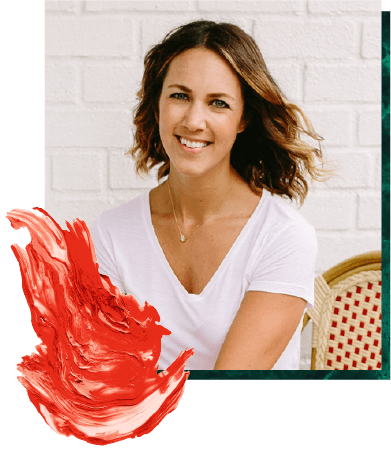
about
Alissa Rumsey, RD.
Alissa Rumsey, MS, RD, CDN, CSCS (pronouns she/her/hers) is a registered
dietitian, nutrition therapist, certified intuitive eating counselor, and the author of
Unapologetic Eating: Make Peace With Food and Transform Your Life. Alissa is
passionate about helping people reclaim the space to eat and live,
unapologetically.

A twice-a-month round-up of inspirational stories, lessons, practical tips and encouragement for living your most authentic, unapologetic life.
The Unapologetic Life
RECENT POSTS

The Unapologetic Life
A twice-a-month round-up of inspirational stories, lessons, practical tips and encouragement for living your most authentic, unapologetic life.

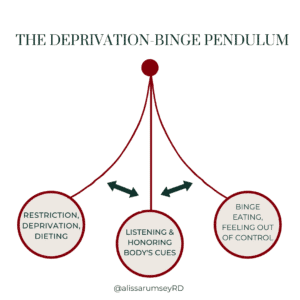





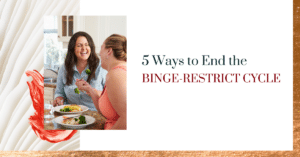
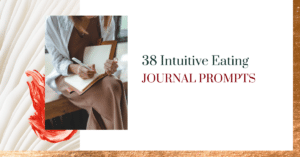
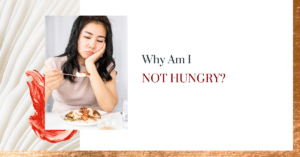
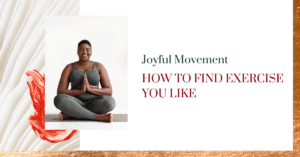

I absolutely love this post! This fact of why we binge = IT IS BECUASE WE DON’T KNOW WHEN WILL BE THE NEXT TIME WE WILL HAVE THIS CERTAIN FOOD AGAIN; was mind-blowing for me, life changing. It seems quite simple yes, but this wasn’t clear to me, and like a huge AHA-effect.
Thank you so much for your post and your blog, it is helping me so much!
love
Georgia
Thanks so much for the feedback Georgia, I’m so happy this resonated with you and is helping! Intuitive eating can be totally and completely life-changing in the very best way 🙂
Can you please give me more information on this
Hi Diana, for more info on how dieting/restriction leads to binging you can check out:
https://alissarumsey.com/intuitive-eating/how-to-shift-your-mindset-move-towards-intuitive-eating/
https://alissarumsey.com/nutrition/halloween-candy-binge/
Just signed up to receive the 5-MINUTE MINDFUL EATING EXERCISE e-guide. So excited to hear more from you on this topic Alissa. 🙂
Wonderful, I hope you enjoy it!
I was introduced to your website by my nutritionist and I find it very informative. I’ve been trying to read every post. It’s going to take a while to catch up but I intend to read everything very carefully and try to follow your wellness advice.
Everything makes perfect sense to me and I look forward to better my eating habits.
Thanks for the kind words Goli!
Just signed up for my free 5 minute mindful eating exercises
I have been in recovery from anorexia nervosa for about three years now. I recovered through mindful eating and still do that, also I didn’t know I was doing intuitive eating but when I read the article I realised yeah that’s what I’m doing like I eat anything that I want to eat and don’t over eat at all etc. I have recently started a job as a dance teaching dancing was one of my main forms of recovery so I use it to help other people find happiness etc. Now that I have a different schedule and work until very late in the evenings I was wondering is it healthy for me to change my eating schedule? I used to eat like three times a day breakfast lunch and dinner and usually a snack in between. I have been taught that meal timing is important lol lik to not deprive yourself or anything. Now I’m wondering if it’s ok to only eat twice a day since I sleep in every morning cus I only start work at 1pm-10 pm. Lik have breakfast at around 10:30/11:00 and then dinner at about 16:00. Then I’ll have a snack around 20:00 or in the afternoon if I like. Is this ok or is it just my eating disorder mentality telling me there is a problem with changing mealtimes????? I think to me I still have a fear of when to eat I used to be obsessed with what time to eat. I’ve found I don’t really care much anymore it’s just now that my schedule is different I’m thinking this is a easier way to eat. But is it healthy, cus I wake up at like 8:30 and then I’m not hungry until eleven or so. I think I’m scared cus I’ve been told u should eat a half hour after waking up. Is this true? Thanks!
Hi Simone, thanks for reaching out! So I can’t give specific advice around eating times without working with you since it sounds like you are in the recovery process. Do you have a therapist and/or dietitian who know you and could give you more specific insight on if this is something that would work well for you?
I’m in the process of launching my own blog based on Authentic Wellness. The nutrition piece will be centered on a non dieting approach to healthy eating with a big focus on self acceptance & making peace with our bodies and food!
I am so glad I found you in my research!
Feeling super inspired that we might have a movement here!
Thanks for sharing and leading others to this path!
I have found this so interesting to read
Are these principles presuming everyone has their health.
I know some folks who have type 1 and type 2 diabetes.
Also some allergies to certain foods.
The loving and wise choice for them is to not eat certain foods.
Hi Carol, yes, intuitive eating is for everyone! The problem with diets, even if for specific health issues, is that the restrictions can still trigger overeating or binging. So instead of making things off limits (unless there is truly an immediate life threatening situation), start by giving yourself permission to eat all foods. Once you do that, eventually you learn to trust your body and overeating or binging slows. You can then make food decisions based on direct experience & for self-care, rather than because it’s off limits.
Sounds like common sense but what about variety in what we eat. Surely it can’t be healthy to eat just a handful of food stuffs even if they satisfy our hunger. Eg, a pizza slice and fries every day.
Hi Annette, there’s this belief that intuitive eating means eat whatever you want, anytime you want. But that’s not exactly the case. With Intuitive Eating, you have permission to eat what you want, anytime you want, but that doesn’t mean you always do that. Hunger, fullness, satisfaction, how food makes us feel – those are all important; but Intuitive Eating also means using your brain and life experience. Once you work through the process of getting rid of the diet-y and restrictive voice, you can listen to your brain and make a decision on what to eat that is based on self-care, and one that honors your health and your body’s needs.
Hey! I try to stick to intuitive eating, but it’s hard in college. Due to my class/work schedule and dining hall hours, I frequently find myself eating when I’m not that hungry. I have to eat at certain times because it’ll be my last chance to eat for hours (or the night!) I hate doing this as it leaves me feeling sick and over-full (as well as bloated the next day!) How do you approach and fit in intuitive eating with a busy schedule?
A strict schedule like this can definitely make it tougher to listen to/be able to honor your hunger/fullness cues. But this is a case where another type of hunger – planned hunger – comes into play. It sounds like you’re helping your body out by eating when you’re able to, though I’m curious about your mention of being sick/over-full. Why do you think that might be? Another thought – is there any way you can keep snacks on hand/bring snacks with you to fill in the gaps when you’re in class?
I have recently started eating intuitively. But it was a completely natural process – I got healthier mentally, dealt with all the issues that made me binge & walaaaa I was eating when I wanted, eating way more healthy & didn’t binge. I have not counted calories nor deprived myself once. It’s been the biggest blessing I could’ve given myself. Thank you for sharing this – I hope it resonates in everyone!! The diet culture dooms is all for failure.. no quick fixes, rather a happy sustainable lifestyle so we can be happy long term.
Intuitive eating sounds so easy but I wonder how it is related to a better cholesterol levels? Are there studies that show this? Also what about people who are on medications that cause them to overeat like antidepressants? How can intuitive eating help them if something in their brain is making them overeat?
Intuitive eating has been linked to lower levels of total cholesterol and LDL cholesterol in at least one study. For people on medications that may increase appetite, intuitive eating can still help. IE is an approach that is about making health and food decisions from a place of self-care rather than self-control, and in this case the focus would be on finding nourishing foods that sustain them while still listening to their hunger-fullness cues.
Hiya
I’d really like to start intuitive eating but I am fat and worried my hunger hormones are all out of whack because of my size. I am always hungry. It’s like my body wants a lot of calories a day, and that’s without emotional eating as well! I don’t know what’s wrong with me. I even get hungry in the night. (I def dont have diabetes).
Is it ok to do intuitive eating even if you’re hungry all the time?
Thanks x
Hi Lucy, the constant hunger is something that you could explore with an intuitive eating dietitian – they could help you explore this hunger more and figure out some ways to reduce restriction (which often causes hunger) and eating more filling, satisfying meals.
I have food intolerances to all grains and all cows milk products. If I eat these foods I get a big escalation in lain(IhVe fibromyalgia). However it is very restricting not to eat any grains and I often find it hard to feel full. Is there a way to get these back into my diet?
Hi Jo, it can definitely be hard when working with a medical food restriction. This is something I highly recommend working with a dietitian on, specifically one with experience with food intolerances. There can be ways to manage your intolerances without feeling like restriction, but since it’s specific to each person I can’t give much specific advice through the blog. Brenna, our other dietitian, wrote a post on this recently (https://alissarumsey.com/intuitive-eating/intuitive-eating-food-allergies/)and does work with people with intolerances – you can find more info about her services here: https://alissarumsey.com/nutrition-coaching/
“They know when they feel like eating veggies and also when they feel like having dessert (and don’t feel guilty or have any regrets with either choice).”
Lol. I’d eat veggies like once a week and candy every day. Without starting with a healthy eating structure and years of therapy, this does not work for a lot of people. There is no single thing that works for everyone.
Hi Carmen, it’s a really common concern to feel like you’d want to eat candy every day and rarely want vegetables. But intuitive eating does take into consideration, making decisions to eat – for example – vegetables more frequently but from a place of self-care rather than a place of restriction. Intuitive eating is about first working to unpack the diet culture/ideas that you may have internalized over the years while tuning into your own body. Then, adding in some gentle nutrition, you can start to experiment with what feels good in/for your body. You’re right, it does take time, however, it can work for all people with the right amount of support, time, and of course access to food.
Hi Alissa,
Thank you so much for this post. I am someone who is in a 12 step fellowship for my eating disorder recovery. I currently follow a meal plan – but part of me still feels controlled by the food a little bit.
I can appreciate having a “plan” to make sure that my body is being nourished with all necessary components (protein, fat, veggie, starch etc) , but certain foods are off limits on my plan…and I find it frustrating that I cannot listen to my body if for example I’m too full to finish my meal OR I’m not full enough and can’t have any more to eat. I don’t like having to check food labels to see if there are certain ingredients on the label. It feels “diet-y”.
I do not have any intuitive eating nutritionists in my area.
I am scared of intuitive eating although i think it might be what I need to do.
What are your thoughts?
Hi Emily, great question! Intuitive eating isn’t really possible while in active recovery from an ED, it’s something that comes later on in the recovery process. Since I’m not one of your providers, I can’t give more specific info on if/when you may be ready to incorporate intuitive eating. I would ask your dietitian or treatment team for their thoughts on this. Best of luck!
I am very interested in intuitive eating. Can it work with with post menopausal women? I tried intermittent fasting and dieting but the weight will not come off. If anything I gained weight. I find it very stressful.
Hi Paola, yes – intuitive eating is for everyone 🙂 Intuitive eating is a non-diet approach to health (physical AND mental/emotional health). It puts the focus on your internal cues like hunger, fullness and satisfaction, and moving away from external cues like food rules and restrictions. While many of our clients are not happy in their bodies and would like to lose weight, this is not the focus or goal of intuitive eating. Weight loss must be put on the back burner as you go through the Intuitive Eating process. If you are focused on losing weight, you’ll undermine the Intuitive Eating process. Some people naturally lose weight during this process, and others don’t. As you go through the intuitive eating process and heal your body from the diet mentality, your weight will stabilize at the place it is meant to be. This is why a lot of our work is not only focused on intuitive eating, but also on body image healing and body acceptance. If you’re interested in learning more about this you can check out our coaching packages at http://www.alissarumsey.com/nutrition-coaching. Or if you want to dive into intuitive on your own to start, our online, self-paced intuitive eating crash course would be helpful for this: http://www.alissarumsey.com/product/intuitive-eating-crash-course/. Let me know if you have any other questions!